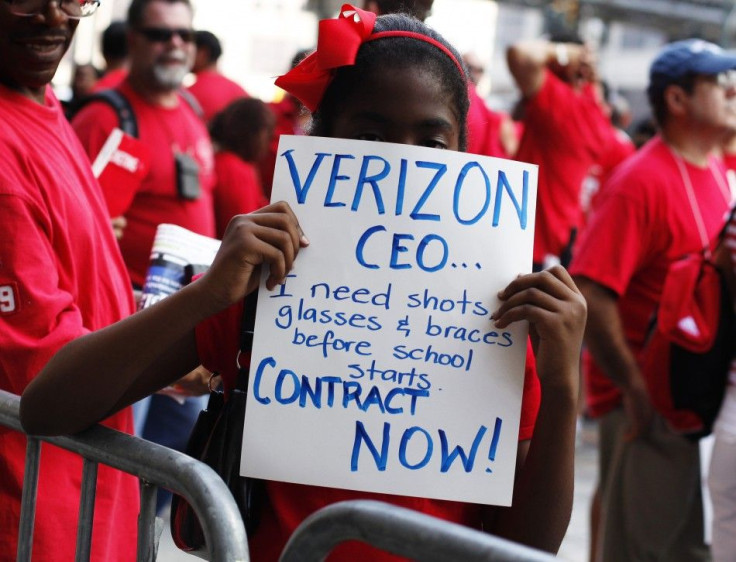Verizon Strike 2011: Talks Resume; Unease Grows Among Some Workers

The 45,000 striking Verizon workers went back on the job a week-and-a-half ago in good faith that a new contract can be agreed upon, but in the wake of Hurricane Irene new tensions have arisen as negotiation talks were set to resume Wednesday.
The striking landline workers agreed to end their work stoppage that began Aug. 7 and lasted two weeks so they could get back to work while union leaders and management negotiated in earnest to reach a new deal. But during Hurricane Irene Verizon Communications faced more criticism from one of the unions involved in leading 45,000 workers on strike.
Communications Workers of America District 1 vice president Chris Shelton told the Huffington Post that Verizon union landline Verizon employees are ready, willing and more than able to work extra hours to repair damaged landline service to customers in New York state, but that the company was intent on denying the workers who went on strike overtime as punishment for the strike that turned nasty at times amid high tensions.
Verizon spokesman John Bonomo said the company did experience service disruptions during Irene but denied that the company was holding back on overtime to make repairs.
Bonomo suggested in the Huffington Post that Verizon suffered no major outages. He said the company had not declared an emergency to kick in such overtime hours since traditional landline phone is not as vital as it had been in past years.
Verizon and the unions, including the CWA and the International Brotherhood of Electrical Workers, are still negotiating to reach a new deal. Talks resumed today, after the end of the strike was justified by the unions on grounds that management was prepared to start to bargain seriously.
Verizon is seeking a reported $1 billion in cuts, including reductions in health care, pensions and other benefits, as well as the elimination of job security.
Many Verizon landline workers are reportedly annoyed at the union decision to return to work since the sides were so far apart. The company has argued that the biggest issue in the strike was division over health care costs, while workers interviewed by IBTimes during the strike claimed the company was trying to effectively bust the union with so many issues on the table.
But some reports indicate there is widespread unsease and anger over the return to work among some workers. The World Socialist Web Site reporetedly talked to a number of workers in New York City after the return to work who claimed dissatisfaction with the move. They aren't sure Verizon is serious about backing off such high demands.
I think we should have stayed out on strike until our negotiations were settled and until Verizon gives up all the 100 takeaways now on the table, said Roxanne, a customer service representative at West Street in New York. In addition, I think we deserve a raise. But the union didn't ask for anything.
© Copyright IBTimes 2024. All rights reserved.











